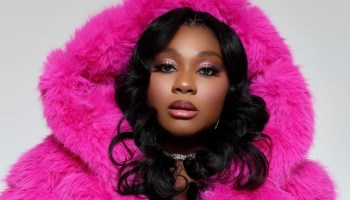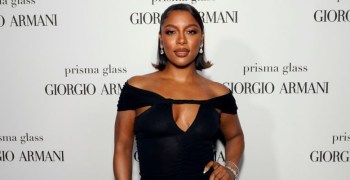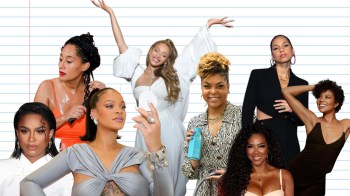Hollywood heavyweight Benedict Cumberbatch quickly learned how to get schooled by the Internet when he accidentally referred to Black actors, as not “Black” or “or color” but, “colored.” The current Oscar nominee, who was formerly seen in 2013’s 12 Years A Slave, said the archaic term during his conversation with PBS (and Black) host, the prominent Tavis Smiley. He was trying to make a point about how in the U.K., where he is from, he’s noticed how Black actors were often giving a difficult time when trying to book gigs.
MUST READ: Chris Rock Ethers Hollywood’s ‘White Industry’ In Essay
And this is a worthwhile observation to make note of, only because Black actors here in America have also expressed similar woes. Cumberbatch’s sentiment for more equality lost some steam however the moment he used ‘colored.’ Or did it? Here’s the full excerpt of the flub below:
“I think as far as colored actors go, it gets really different in the U.K., and a lot of my friends have had more opportunities here [in the U.S.] than in the U.K., and that’s something that needs to change.”
Smiley touched on the topic of race and racism in Hollywood because of the backlash the Oscars have received in overlooking David Oyelowo, a fellow Brit, for this year’s Best Actor nomination for his critics-praised work in Selma.
While we can appreciate the effort to speak up from Cumberbatch…the word “colored”? Chile! We gotta work on that. When he was lambasted online and many were offended by the simple notion of the word’s presence, but it’s also interesting that he used it at all because when you hear it in use today, it’s usually from those of a earlier generation. Cumberbatch is only 38! How did such an old term find its way into his vocab? Could it be the old English side of his upbringing?
Via People magazine, he’s since issued a lengthy apology, and recognized he was wrong:
“I’m devastated to have caused offense by using this outmoded terminology. I offer my sincere apologies. I make no excuse for my being an idiot and know the damage is done.
I can only hope this incident will highlight the need for correct usage of terminology that is accurate and inoffensive. The most shaming aspect of this for me is that I was talking about racial inequality in the performing arts in the U.K. and the need for rapid improvements in our industry when I used the term.
I feel the complete fool I am and while I am sorry to have offended people and to learn from my mistakes in such a public manner please be assured I have. I apologize again to anyone who I offended for this thoughtless use of inappropriate language about an issue which affects friends of mine and which I care about deeply.”
Smiley also backed Cumberbatch in that in talking about his unfortunate a slip-up overlooks the bigger issue his guest was trying to offer, which is that Black actors aren’t getting the work they deserve to be considered for. And he may be right, especially when talking about the British film business. It’s been noted lately in a number of American-based or backed films, a lot of the Black actors and actresses cast were British, included the talents like Oyelowo, Carmen Egojo and Chiwetel Ejiofor. Smiley tweeted:
Across the pond, U.K. communities have offered some thoughtful criticism about Cumberbatch’s word choice, including the charity Show Racism The Red Card. An unnamed spokesperson disclosed to the U.K. paper The Independent that Cumberbatch meant well in his statement and maybe by using that term “colored,” it indirectly boosted his point of how Black people are represented or seen through the eyes of others and that may ultimately be the root of the problem (at least in Hollywood where racism is still practiced but secretive. The Sony hacks proved this):
“The lack of representation of people from black and ethnic minority backgrounds within certain industries in the UK is an issue which needs addressing, and we are pleased that Benedict has spoken out in support of more appropriate representation and of the views of actors and campaigners like Lenny Henry.
“In doing so, he has also inadvertently highlighted the issue of appropriate terminology and the evolution of language. Show Racism the Red Card feel that the term ‘coloured’ is now outdated and has the potential to cause offence due to the connotations associated with the term and its historical usage.
“Appropriate terminology differs from country to country; for example, we know that in some countries the term ‘coloured’ is still widely used, and that in the US the term ‘people of colour’ is quite common.”
Should we get rid of the term “colored” in reference to Black people? In America, out greatest organization, the NAACP has the word in its title, but many of us that are Black and brown don’t feel any less connected to his historical roots because of it. It’s possibly as controversial as the N-word but a worthwhile debate to have on whether or not ‘colored’ should still be in existence.
Beauties, how do you feel about this story? Sound off in the comments below.
RELATED STORIES:
They Tried It: Target Called Out For ‘Whitewashed’ ‘Annie’ Ads
The Hollywood Shuffle: Do We Really Need Another White Man On Late Night TV?
Rev. Al Sharpton Meets Racist Sony Exec & Here’s What We Think She Had To Say About It





















